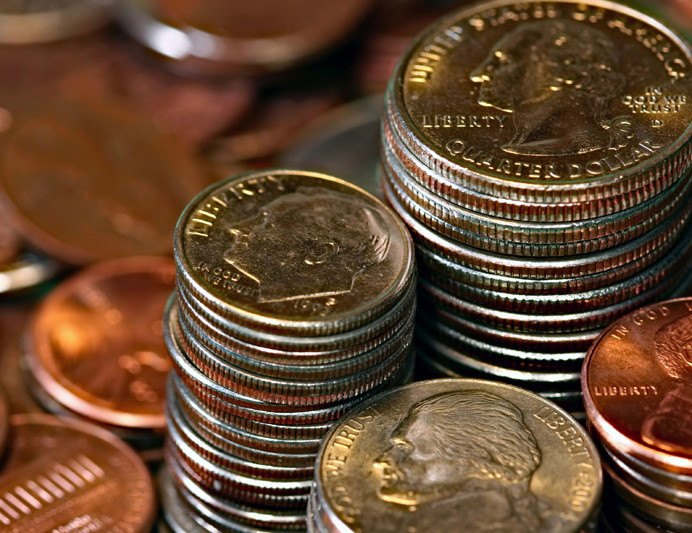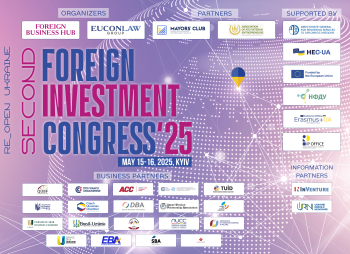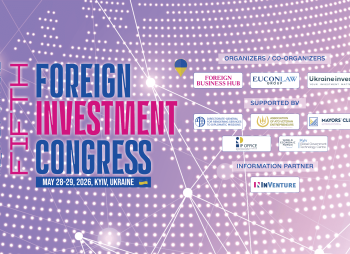After spending a few months in Ukraine, it’s saddens me to see the progress on reforms - or visible lack thereof.
Sure, there is a trickle of good news, and government has plenty on its plate - dealing with restructuring of debt, pushing the legislative agenda, adopting a set of goals for Ukraine 2020 - which has a lot of good slogans, similar to promises back from the Soviet days that “current generation of Soviet people will live under communism.”
However, abstract and broad goals do not focus the attention of the ministers and their staff as well as concrete, tough and achievable goals.
I strongly believe that such a goal could be a national push to achieve a run rate of $10 billion per annum in foreign direct investment.
This is a small enough figure, overall capacity of Ukrainian economy to attract investment is much larger - and we already had similar amounts of foreign direct investment in 2007/2008.
Yet currently the country is failing miserably to achieve even this run rate on investment. The excuses are many - war with Russia backed separatists being the obvious one. Yet, even with the conflict continuing to be unresolved, the government is not doing the heavy lifting needed to open the country for investment and build the future tax base and prosperity of the nation.
Setting such a goal, a run rate of approximately $1 billion a month in investment, should galvanize all branches of government into action. Achieving this would require tangible improvements on all fronts - most importantly, in the financial sector, ensuring free flow of capital, allowing foreigners easy access to Ukrainian assets and guaranteeing their ability to repatriate profits or cut their losses.
Improvements in enforcement of property rights are essential, as is transparent infrastructure well integrated into the world financial system. Other areas would need to show massive improvements also - simplification of the tax code, deregulation, reform of the legislature.
Tackling corruption is essential. All of these things will result in improvements of the Doing Business rankings - however, the rankings are only secondary to actually attracting investment. The proof is in the pudding, and no amount of reports can be substituted for hard cash going into the country. Only when investors, both short and long term ones, are convinced that there is opportunity to make money in the country we will see them showing their confidence by putting real money on the table - and the government can know that it’s doing its job properly.
The opportunities in the country are abundant - after devaluation and the recent stresses, the businesses are valued at very low multiples compared to even their emerging markets peers. There is a tremendous amount of goodwill from European politicians and businesses who sympathize with our plight to rid ourselves of Soviet past and join the free world - but sympathy is not enough, it only gives you occasional charity handouts, we must prove that we as a nation respect capital and are willing to work hard to compete internationally and become an attractive destination for investment.
And that takes tremendous focus.
This can become the national idea that brings the government and the people together. There is huge demand from the citizens to change the rules by which the country is operating - respect of the individual, rule of law, transparent and fair business environment are the things we paid a very dear price for during the revolution of dignity.
Sadly, they see lack of progress, and danger of backsliding into Russia’s grasp or becoming a failed state is ever looming. Odessa region offers a glimmer of hope, with appointment of Michael Saakashvili as the region’s governor.
He is not a faceless bureaucrat but a man of action, not keen to have a failure on his resume. He is the only governor who can topple ministers - if he says to the president that some minister is standing in the way of cleaning up the region, the minister will go, not Michael.
If Odessa Oblast will be able to achieve $50-$100 million a month run rate in foreign direct investment, it’s experience can be replicated in the rest of the country - and if it fails, the future for Ukraine will become bleaker still.
Government needs a measurable goal to focus reforms, and foreign direct investment can become such yardstick. And it needn’t worry about where the investment will come from or what industries it’ll go to - the money will find it’s way into the country once it feels loved. This is the beauty of capitalism - if capital feels protected and sees opportunity to grow, it will come.
But so far, government has shown anything but love for other people’s money - capital and currency controls, unfriendly laws and impossible to navigate bureaucracy, vested interests on every corner make investors think twice about coming to Ukraine.
The first capital which will come into the country will be short term, and some will come from “local foreigners” - local businesses that will invest via their offshore subsidiaries.
No matter, we should welcome all and any capital with open arms, beggars can’t be choosers. It is a job for law enforcement to weed out money that was acquired in illegitimate ways - but in pursuing such enforcement, we should introduce presumption of innocence, and start treating all capital as honest until proven otherwise - unlike the situation today, where all and any capital is viewed with suspicion, creating a huge barrier to entry for legitimate businessmen and making financial system a Cerberus dog of sorts rather than facilitator of business.
There is a myriad excuses people in power can come up with as to why this capital will not come. As an executive, I know that it’s always easier for managers to come up with reasons not to do something rather than just grit their teeth together and do it. It is a matter of political will to set this difficult goal and go about achieving it, no matter what the resistance. And after we achieve $10 billion a year in foreign direct investment, I have the next goal in mind - $20 billion a year in FDI. Capitalism is harsh but fair, and success comes to those countries that focus relentlessly on international competition for capital.
Roman Sulzhyk has worked for over 12 years in banking, first in information technology and later as a foreign exchange and interest rates derivatives trader in JP Morgan and later Deutsche Bank, in New York, London and Moscow. He has been a top executive at Moscow Exchange, running the derivatives market. Currently he is chairman of the supervisory board of National Depository of Ukraine. He has a graduate degree in Economics and Finance from New York University.







